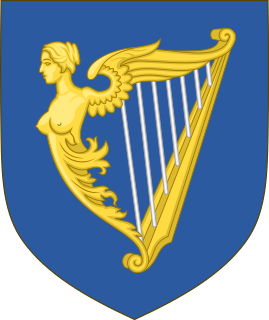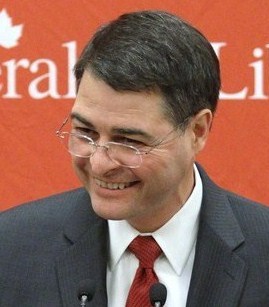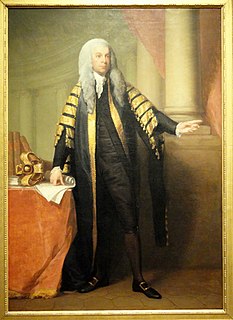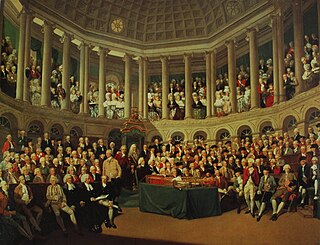
The House of Lords, also known as the House of Peers, is the upper house of the Parliament of the United Kingdom. Membership is by appointment, heredity or official function. Like the House of Commons, it meets in the Palace of Westminster in London, England.

The House of Commons is the lower house of the Parliament of the United Kingdom. Like the upper house, the House of Lords, it meets in the Palace of Westminster in London, England.

The Parliament of the United Kingdom is the supreme legislative body of the United Kingdom, the Crown Dependencies and the British Overseas Territories. It alone possesses legislative supremacy and thereby ultimate power over all other political bodies in the UK and the overseas territories. Parliament is bicameral but has three parts, consisting of the sovereign (Crown-in-Parliament), the House of Lords, and the House of Commons. Both houses of Parliament meet in separate chambers at the Palace of Westminster in the City of Westminster, one of the inner boroughs of the capital city, London.

The Irish House of Commons was the lower house of the Parliament of Ireland that existed from 1297 until 1800. The upper house was the House of Lords. The membership of the House of Commons was directly elected, but on a highly restrictive franchise, similar to the unreformed House of Commons in contemporary England and Great Britain. Catholics were disqualified from sitting in the Irish parliament from 1691, even though they comprised the vast majority of the Irish population.

The Acts of Union 1800 were parallel acts of the Parliament of Great Britain and the Parliament of Ireland which united the Kingdom of Great Britain and the Kingdom of Ireland to create the United Kingdom of Great Britain and Ireland. The acts came into force on 1 January 1801, and the merged Parliament of the United Kingdom had its first meeting on 22 January 1801.
Members of Parliament (MPs) sitting in the House of Commons in the United Kingdom are not permitted to resign their seats. To circumvent this prohibition, MPs who wish to step down are instead appointed to an "office of profit under the Crown", which disqualifies them from sitting in Parliament. For this purpose, a legal fiction is maintained where two unpaid offices are considered to be offices of profit: Steward and Bailiff of the Chiltern Hundreds, and Steward and Bailiff of the Manor of Northstead. Although the House of Commons Disqualification Act 1975 lists hundreds of offices that are disqualifying, it is rare for an MP to be nominated to a legitimate office of profit; no MP lost their seat by being appointed to an actual office between 1981, when Thomas Williams became a judge, and 2022, when Rosie Cooper became the chair of an NHS foundation trust.

Parliament House in Dublin, Ireland, was home to the Parliament of Ireland, and since 1803 has housed the Bank of Ireland. It was the world's first purpose-built bicameral parliament house. It is located at College Green.

The lord chancellor, formally the lord high chancellor of Great Britain, is the highest-ranking traditional minister among the Great Officers of State in Scotland and England in the United Kingdom, nominally outranking the prime minister. The lord chancellor is appointed by the sovereign on the advice of the prime minister. Prior to their Union into the Kingdom of Great Britain, there were separate lord chancellors for the Kingdom of England and the Kingdom of Scotland; there were lord chancellors of Ireland until 1922.
The order of precedence in the United Kingdom is the sequential hierarchy for Peers of the Realm, officers of state, senior members of the clergy, holders of the various Orders of Chivalry and other persons in the three legal jurisdictions within the United Kingdom:

The leader of the House of Lords is a member of the Cabinet of the United Kingdom who is responsible for arranging government business in the House of Lords. The post is also the leader of the majority party in the House of Lords who acts as the government party chairperson in the house. The role is always held in combination with a formal Cabinet position, usually one of the sinecure offices of Lord President of the Council, Lord Keeper of the Privy Seal or Chancellor of the Duchy of Lancaster. Unless the Leader is also a departmental minister, being Leader constitutes the bulk of their government responsibilities, but it has never been an independent salaried office. The Office of the Leader of the House of Lords is a ministerial department.

The speaker of a deliberative assembly, especially a legislative body, is its presiding officer, or the chair. The title was first used in 1377 in England.

The speaker of the House of Commons is the presiding officer of the lower house of the Parliament of Canada. A member of Parliament (MP), they are elected at the beginning of each new parliament by fellow MPs. The speaker's role in presiding over Canada's House of Commons is similar to that of speakers elsewhere in other countries that use the Westminster system.

The Parliament of Great Britain was formed in May 1707 following the ratification of the Acts of Union by both the Parliament of England and the Parliament of Scotland. The Acts ratified the treaty of Union which created a new unified Kingdom of Great Britain and created the parliament of Great Britain located in the former home of the English parliament in the Palace of Westminster, near the City of London. This lasted nearly a century, until the Acts of Union 1800 merged the separate British and Irish Parliaments into a single Parliament of the United Kingdom with effect from 1 January 1801.
In the United Kingdom, representative peers were those peers elected by the members of the Peerage of Scotland and the Peerage of Ireland to sit in the British House of Lords. Until 1999, all members of the Peerage of England held the right to sit in the House of Lords; they did not elect a limited group of representatives. All peers who were created after 1707 as Peers of Great Britain and after 1801 as Peers of the United Kingdom held the same right to sit in the House of Lords.

The Parliament of Ireland was the legislature of the Lordship of Ireland, and later the Kingdom of Ireland, from 1297 until 1800. It was modelled on the Parliament of England and from 1537 comprised two chambers: the House of Commons and the House of Lords. The Lords were members of the Irish peerage and bishops. The Commons was directly elected, albeit on a very restricted franchise. Parliaments met at various places in Leinster and Munster, but latterly always in Dublin: in Christ Church Cathedral, Dublin Castle, Chichester House (1661–1727), the Blue Coat School (1729–31), and finally a purpose-built Parliament House on College Green.

John Foster, 1st Baron Oriel PC (Ire) was an Anglo-Irish peer and politician, who served as Chancellor of the Exchequer of Ireland and as the last Speaker of the Irish House of Commons (1785–1800).

Sir Charles Norman Lockhart Stronge, 8th Baronet, MC, PC, JP was a senior Ulster Unionist Party politician in Northern Ireland.

The Speaker of the Irish House of Commons was the presiding officer of the Irish House of Commons until its disestablishment in 1800.
The House of Commons is the name of several legislatures, most often the lower house in a bicameral system:












